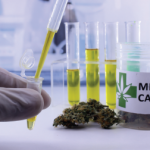(Reuters Health)—In states that legalized medical marijuana, U.S. hospitals failed to see a predicted influx of pot smokers, but in an unexpected twist, they treated far fewer opioid users, a new study shows.
Hospitalization rates for opioid painkiller dependence and abuse dropped on average 23% in states after marijuana was permitted for medicinal purposes, the analysis found. Hospitalization rates for opioid overdoses dropped 13% on average.
At the same time, fears that legalization of medical marijuana would lead to an uptick in cannabis-related hospitalizations proved unfounded, according to the report in Drug and Alcohol Dependence.1
“Instead, medical marijuana laws may have reduced hospitalizations related to opioid pain relievers,” says study author Yuyan Shi, a public health professor at the University of California, San Diego.
“This study and a few others provided some evidence regarding the potential positive benefits of legalizing marijuana to reduce opioid use and abuse, but they are still preliminary,” she says in an email.
Dr. Esther Choo, a professor of emergency medicine at Oregon Health and Science University in Portland, was intrigued by the study’s suggestion that access to cannabis might reduce opioid misuse.
“It is becoming increasingly clear that battling the opioid epidemic will require a multi-pronged approach and a good deal of creativity,” Choo, who was not involved in the study, says in an email. “Could increased liberalization of marijuana be part of the solution? It seems plausible.”
However, she says, “There is still much we need to understand about the mechanisms through which marijuana policy may affect opioid use and harms.”
An estimated 60% of Americans now live in the 28 states and Washington, D.C., where medical marijuana is legal under state law.
Meanwhile, the opioid epidemic—sparked by a quadrupling since 1999 in sales of prescription painkillers, such as Oxycontin and Vicodin—kills 91 Americans a day.
Shi analyzed hospitalization records from 1997–2014 for 27 states, nine of which implemented medical marijuana policies. Her study was the fifth to show declines in opioid use or deaths in states that allow medical cannabis.
Previous studies reported associations between medical marijuana and reductions in opioid prescriptions, opioid-related vehicle accidents and opioid-overdose deaths.
In a 2014 study, Dr. Marcus Bachhuber found deaths from opioid overdoses fell by 25% in states that legalized medical marijuana.
Since last year, when New York rolled out its medical marijuana program, Bachhuber has included cannabis in a menu of options he offers his patients who suffer chronic or severe pain from neuropathy and HIV/AIDS, he says in a phone interview. Bachhuber, a professor at the Albert Einstein College of Medicine and Montefiore Medical Center in the Bronx, was not involved in the new study.



